UNIT-3-My-First-Job课文翻译大学英语二
新视野英语教程-第二册Unit-3-My-First-Job
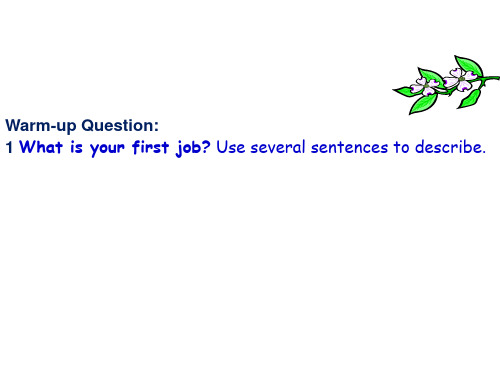
2 Life is an endless journey towards personal_a_c_h_i_e_v_e_ment
3 If you want him tol_e_n_d_ you money, you have to prove that
you are able to give it back.
lack
eventually confidence apply
annual alike pride
plus bill forever achievement serve lend
Guess
feeling of pleasure or satisfaction when doing sth well or owning sth good like one another happening every year trust in or feel sure about one’s ability, idea etc do not have any or enough of sth in the end write a letter or fill in a form to ask formally(正式地) for it added to allow others to have or use it for a period of time sth one has succeeded in doing check always happen or continue work for sb, a company/country etc
tell.
5 It cost me one pound, _p__lu_s__ ten pence to have the letter
新标准大学英语(第二版)综合教程2 Unit 3 A篇练习答案及课文翻译
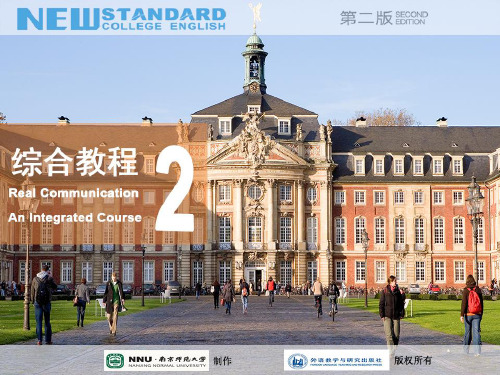
Text
2 Do you think foreigners can understand Chinese sports such as t’ai chi and kung fu? This is a strange question. Why not? Chinese people can surely understand sports which have come to China from other countries, invented or developed by foreigners, can’t they? So the reverse must also be true. Many foreigners are interested in traditional Chinese sports like martial arts and t’ai chi, and if they learn them well they can understand them.
Text
Blowing the whistle on soccer
Discuss the questions Go to the text
Text
1 Work in pairs and discuss the questions. 2 Look at the title and the first two paragraphs of the passage and answer the questions.
Warming Up
Plays usually begin with a “scrimmage” in which players on the field take up particular formations for offence and defence and consist of a series of “downs” (rapid bursts of play in which the offence attempts to advance the ball towards their opponents’ endzone), outside of which the ball is “dead” (out of play). The main points are scored by a 6-point “touchdown” (when the ball is taken to the opponents’ end zone), a 3-point “field goal” (when the ball is kicked through the opponents’ goal posts), or a 2-point “safety” (by tackling an opposing ball carrier in their own end zone).
大学英语精读第三版第二册Unit-3-My-First-Job

Read and analyze
• The opening remark says “the interview goes from bad to worse”. How does the author achieve the effect. Read and find the indicators.
• Chance • Hope • Evidence • Typist • Vegetables • Graduates • Disapproval • Journey
Collocations
1. The local government of the town __a_t_ta_c_h_e_s___ much importance _t_o_ the quality of primary school education.
To his surprise , he got an answer, asking him to go for an interview . However, the interview made him feel everything was __in_fe_r_io_r_t_o_w_h_a_t_h_e_h_a_d_e_x_p_ec_t_e_d__: school conditions, teaching set-up , the teachers, the salary , etc. The last straw is the woman, who really ran the school. He didn’t accept the post at last.
大学英语精读第三版第二册 Unit-3-My-First-Job
Procedure of applying for a job
大学英语精读2课文翻译

Unit1 The Dinner Party 晚宴那个美国人没有参加这场争论,他只是注视着在座的其他客人。
在他这样观察时,他发现女主人的脸上显出一种奇异的表情。
她两眼盯着正前方,脸部肌肉在微微抽搐。
她向站在座椅后面的印度男仆做了个手势,对他耳语了几句。
男仆两眼睁得大大的,迅速地离开了餐室。
在座的客人中除了那位美国人以外谁也没注意到这一幕,也没有看到那个男仆把一碗牛奶放在紧靠门边的走廊上。
那个美国人突然醒悟过来。
在印度,碗中的牛奶只有一个意思——引蛇的诱饵。
他意识到餐室里一定有条眼镜蛇。
Unit2 Lessons from Jefferson 杰斐逊的遗训杰斐逊的勇气和理想主义是以知识为基础的。
他懂得的东西也许比同时代的任何人都要多。
在农业、考古学和医学方面他都是专家。
在人们普遍采用农作物轮作和土壤保持的做法之前一个世纪,他就这样做了。
他还发明了一种比当时任何一种都好的耕犁。
他影响了整个美国的建筑业,他还不断地制造出各种机械装置,使日常生活中需要做的许多工作变得更加容易。
在杰斐逊的众多才能中,有一种是最主要的:他首先是一位优秀的、不知疲倦的作家。
目前正在第一次出版的他的全集将超过五十卷。
他作为一个作家的才能很快便被发现了,所以,当1776年在费城要撰写《独立宣言》的时刻来到时,这一任务便落在了他肩上。
数以百万计的人们读到他写的下列词句都激动不已:“我们认为这些真理是不言而喻的:一切人生来就是平等的……”Unit3 My First Job 我的第一份工作在我等着进大学期间,我在一份地方报纸上看到一则广告,说是在离我住处大约十英里的伦敦某郊区,有所学校要招聘一名教师。
我因为手头很拮据,同时也想做点有用的事,于是便提出了申请,但在提出申请的同时我也担心,自己一无学位,二无教学经验,得到这份工作的可能性是微乎其微的。
然而,三天之后,却来了一封信,叫我到克罗伊登去面试。
这一路去那儿原来还真麻烦:先乘火车到克罗伊顿车站,再乘十分钟的公共汽车,然后还要至少步行四分之一英里。
新视野第三版大学英语第二册课文翻译

新视野大学英语第二册读写教程课文翻译Unit 1 Text A An impressive Engli lsesson标题: 一堂难忘的英语课1. 如果我是唯一一个还在纠正小孩英语的家长,那么我儿子也许是对的。
对他而言,我是一个乏味的怪物:一个他不得不听其教诲的父亲,一个还沉湎于语法规则的人,对此我儿子似乎颇为反感。
2. 我觉得我是在最近偶遇我以前的一位学生时,才开始对这个问题认真起来的。
这个学生刚从欧洲旅游回来。
我满怀着诚挚期待问她:“欧洲之行如何?”3. 她点了三四下头,绞尽脑汁,苦苦寻找恰当的词语,然后惊呼:“真是,哇!”4. 没了。
所有希腊文明和罗马建筑的辉煌居然囊括于一个浓缩的、不完整的语句之中!我的学生以“哇!”来表示她的惊叹,我只能以摇头表达比之更强烈的忧虑。
5. 关于正确使用英语能力下降的问题,有许多不同的故事。
学生的确本应该能够区分诸如 their/there/they're 之间的不同,或区别 complimentary 跟complementary 之间显而易见的差异。
由于这些知识缺陷,他们承受着大部分不该承受的批评和指责,因为舆论认为他们应该学得更好。
6. 学生并不笨,他们只是被周围所看到和听到的语言误导了。
举例来说,杂货店的指示牌会把他们引向 stationary(静止处),虽然便笺本、相册、和笔记本等真正的stationery(文具用品)并没有被钉在那儿。
朋友和亲人常宣称 They've just ate。
实际上,他们应该说 They've just eaten。
因此,批评学生不合乎清理。
7. 对这种缺乏语言功底而引起的负面指责应归咎于我们的学校。
学校应对英语熟练程度制定出更高的标准。
可相反,学校只教零星的语法,高级词汇更是少之又少。
还有就是,学校的年轻教师显然缺乏这些重要的语言结构方面的知识,因为他们过去也没接触过。
学校有责任教会年轻人进行有效的语言沟通,可他们并没把语言的基本框架一一准确的语法和恰当的词汇一一充分地传授给学生。
UNIT 3 My First Job课文翻译大学英语二教学文案

UNIT 3 My First JobTrying to make some money before entering university, the author applies for a teaching job. But the interview goes from bad to worse...While I was waiting to enter university, I saw advertised in a local newspaper a teaching post at a school in a suburb of London about ten miles from where I lived. Being very short money and wanting to do something useful, I applied, fearing as I did so, that without a degree and with no experience in teaching my chances of getting the job were slim.However, three days later a letter arrived, asking me to go to Croydon for an interview. It proved an awkward journey: a train to Croydon station; a ten-minute bus ride and then a walk of at least a quarter to feel nervous.The school was a red brick house with big windows, The front garden was a gravel square; four evergreen shrubs stood at each corner, where they struggled to survive the dust and fumes from a busy main from a busy main road.It was clearly the headmaster himself that opened the door. He was short and fat. He had a sandy-coloured moustache, a wrinkled forehead and hardly any hair.He looked at me with an air of surprised disapproval, as a colonel might look at a private whose bootlaces were undone. 'Ah yes,' he grunted. 'You'd better come inside.' The narrow, sunless hall smelled unpleasantly of stale cabbage; the walls were dirty with ink marks; it was all silent. His study, judging by the crumbs on the carpet, was also his dining-room. 'You'd better sit down,' he said, and proceeded to ask me a number of questions: what subjects I had taken in my General School Certificate; how old I was; what games I played; then fixing me suddenly with his bloodshot eyes, he asked me whether I thought games were a vital part of a boy's education. I mumbled something about not attaching too much importance to them. He grunted. I had said the wrong thing. The headmaster and I obviously had very little in common.The school, he said, consisted of one class of twenty-four boys, ranging in age from seven to thirteen. I should have to teach all subjects except art, which he taught himself. Football and cricket were played in the Park, a mile away on Wednesday and Saturday afternoons.The teaching set-up filled me with fear. I should have to divide the class into three groups and teach them in turn at three different levels; and I was dismayed at the thought of teaching algebra and geometry-two subjects at which I had been completely incompetent at school. Worse perhaps was the idea of Saturday afternoon cricket; most ofmy friends would be enjoying leisure at that time.I said shyly, 'What would my salary be?' 'Twelve pounds a week plus lunch.' Before I could protest, he got to his feet. 'Now', he said, 'you'd better meet my wife. She's the one who really runs this school.'This was the last straw. I was very young: the prospect of working under a woman constituted the ultimate indignity.进入大学之前,尽力去攒一些钱。
新标准大学英语综合教程2 课文翻译
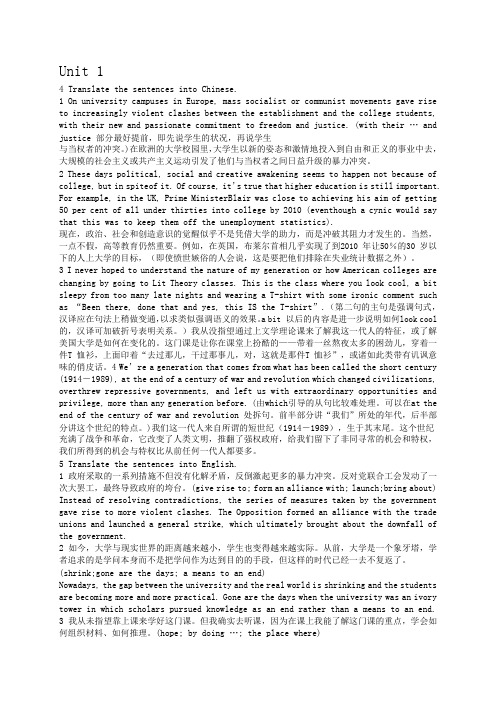
Unit 14 Translate the sentences into Chinese.1 On university campuses in Europe, mass socialist or communist movements gave rise to increasingly violent clashes between the establishment and the college students, with their new and passionate commitment to freedom and justice. (with their … and justice 部分最好提前,即先说学生的状况,再说学生与当权者的冲突。
)在欧洲的大学校园里,大学生以新的姿态和激情地投入到自由和正义的事业中去,大规模的社会主义或共产主义运动引发了他们与当权者之间日益升级的暴力冲突。
2 These days political, social and creative awakening seems to happen not because of college, but in spiteof it. Of course, it’s true that higher education is still important. For example, in the UK, Prime MinisterBlair was close to achieving his aim of getting 50 per cent of all under thirties into college by 2010 (eventhough a cynic would say that this was to keep them off the unemployment statistics).现在,政治、社会和创造意识的觉醒似乎不是凭借大学的助力,而是冲破其阻力才发生的。
大学英语精读第三版第二册课文翻译
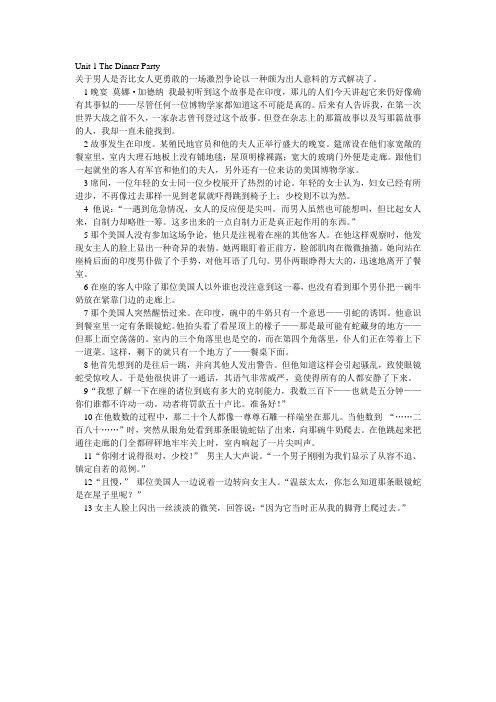
Unit 1 The Dinner Party关于男人是否比女人更勇敢的一场激烈争论以一种颇为出人意料的方式解决了。
1晚宴莫娜·加德纳我最初听到这个故事是在印度,那儿的人们今天讲起它来仍好像确有其事似的——尽管任何一位博物学家都知道这不可能是真的。
后来有人告诉我,在第一次世界大战之前不久,一家杂志曾刊登过这个故事。
但登在杂志上的那篇故事以及写那篇故事的人,我却一直未能找到。
2故事发生在印度。
某殖民地官员和他的夫人正举行盛大的晚宴。
筵席设在他们家宽敞的餐室里,室内大理石地板上没有铺地毯;屋顶明椽裸露;宽大的玻璃门外便是走廊。
跟他们一起就坐的客人有军官和他们的夫人,另外还有一位来访的美国博物学家。
3席间,一位年轻的女士同一位少校展开了热烈的讨论。
年轻的女士认为,妇女已经有所进步,不再像过去那样一见到老鼠就吓得跳到椅子上;少校则不以为然。
4他说:“一遇到危急情况,女人的反应便是尖叫。
而男人虽然也可能想叫,但比起女人来,自制力却略胜一筹。
这多出来的一点自制力正是真正起作用的东西。
”5那个美国人没有参加这场争论,他只是注视着在座的其他客人。
在他这样观察时,他发现女主人的脸上显出一种奇异的表情。
她两眼盯着正前方,脸部肌肉在微微抽搐。
她向站在座椅后面的印度男仆做了个手势,对他耳语了几句。
男仆两眼睁得大大的,迅速地离开了餐室。
6在座的客人中除了那位美国人以外谁也没注意到这一幕,也没有看到那个男仆把一碗牛奶放在紧靠门边的走廊上。
7那个美国人突然醒悟过来。
在印度,碗中的牛奶只有一个意思——引蛇的诱饵。
他意识到餐室里一定有条眼镜蛇。
他抬头看了看屋顶上的椽子——那是最可能有蛇藏身的地方——但那上面空荡荡的。
室内的三个角落里也是空的,而在第四个角落里,仆人们正在等着上下一道菜。
这样,剩下的就只有一个地方了——餐桌下面。
8他首先想到的是往后一跳,并向其他人发出警告。
但他知道这样会引起骚乱,致使眼镜蛇受惊咬人。
于是他很快讲了一通话,其语气非常威严,竟使得所有的人都安静了下来。
UNIT 3 My First Job课文翻译大学英语二
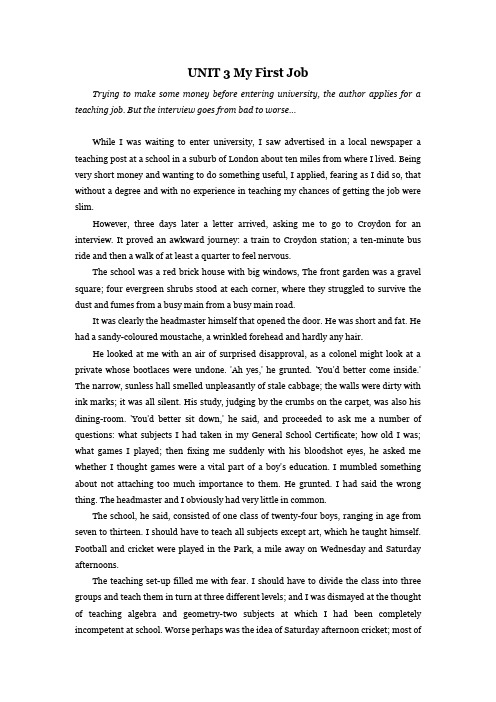
UNIT 3 My First JobTrying to make some money before entering university, the author applies for a teaching job. But the interview goes from bad to worse...While I was waiting to enter university, I saw advertised in a local newspaper a teaching post at a school in a suburb of London about ten miles from where I lived. Being very short money and wanting to do something useful, I applied, fearing as I did so, that without a degree and with no experience in teaching my chances of getting the job were slim.However, three days later a letter arrived, asking me to go to Croydon for an interview. It proved an awkward journey: a train to Croydon station; a ten-minute bus ride and then a walk of at least a quarter to feel nervous.The school was a red brick house with big windows, The front garden was a gravel square; four evergreen shrubs stood at each corner, where they struggled to survive the dust and fumes from a busy main from a busy main road.It was clearly the headmaster himself that opened the door. He was short and fat. He had a sandy-coloured moustache, a wrinkled forehead and hardly any hair.He looked at me with an air of surprised disapproval, as a colonel might look at a private whose bootlaces were undone. 'Ah yes,' he grunted. 'You'd better come inside.' The narrow, sunless hall smelled unpleasantly of stale cabbage; the walls were dirty with ink marks; it was all silent. His study, judging by the crumbs on the carpet, was also his dining-room. 'You'd better sit down,' he said, and proceeded to ask me a number of questions: what subjects I had taken in my General School Certificate; how old I was; what games I played; then fixing me suddenly with his bloodshot eyes, he asked me whether I thought games were a vital part of a boy's education. I mumbled something about not attaching too much importance to them. He grunted. I had said the wrong thing. The headmaster and I obviously had very little in common.The school, he said, consisted of one class of twenty-four boys, ranging in age from seven to thirteen. I should have to teach all subjects except art, which he taught himself. Football and cricket were played in the Park, a mile away on Wednesday and Saturday afternoons.The teaching set-up filled me with fear. I should have to divide the class into three groups and teach them in turn at three different levels; and I was dismayed at the thought of teaching algebra and geometry-two subjects at which I had been completely incompetent at school. Worse perhaps was the idea of Saturday afternoon cricket; most ofmy friends would be enjoying leisure at that time.I said shyly, 'What would my salary be?' 'Twelve pounds a week plus lunch.' Before I could protest, he got to his feet. 'Now', he said, 'you'd better meet my wife. She's the one who really runs this school.'This was the last straw. I was very young: the prospect of working under a woman constituted the ultimate indignity.进入大学之前,尽力去攒一些钱。
工程硕士研究生英语基础教程Unit_1_My_First_Job翻译

My First JobTwo noted Americans explain whyIt’s not what you earn----it’s what you learnCompiled by Daniel LevineThe Auto Prepper (Jay Leno)I acquired a very strong work ethic from my parents, both of whom lived through the Great Depression. They couldn’t understand people who didn’t work regularly. I once told my mom that Sylvester was getting $12 million for ten weeks of work. “What’s he going to do the rest of the year?” She asked.我从父母那儿获得了很强的工作道德观。
他们俩都经历过大萧条时期,对不是按常规工作的人感到难以理解。
我曾经告诉我妈妈,西尔维斯特·史泰龙工作10周挣1200万美元。
“那他在一年其余的日子里干什么呢?”她问。
I took my parents’ work ethic into my first job at Wilmington Ford near my hometown of Andover, Mass, when I was 16. I worked until five or six o’clock on school days and put in 12-hour days during the summer as a prepper. This meant washing and polishing the new cars, and making sure the paper floor mats were in place. Another responsibility was taking off the hubcaps at night, so they wouldn’t get stole n and replacing them the next day. This was hard work because we had about seven acres of cars.我把父母的工作道德观带人了我在故乡马萨诸塞州安多佛镇附近的威尔明顿镇福特汽车专营店干的第一份工作。
新视野大学英语2 第三版Unit2-3 课文翻译
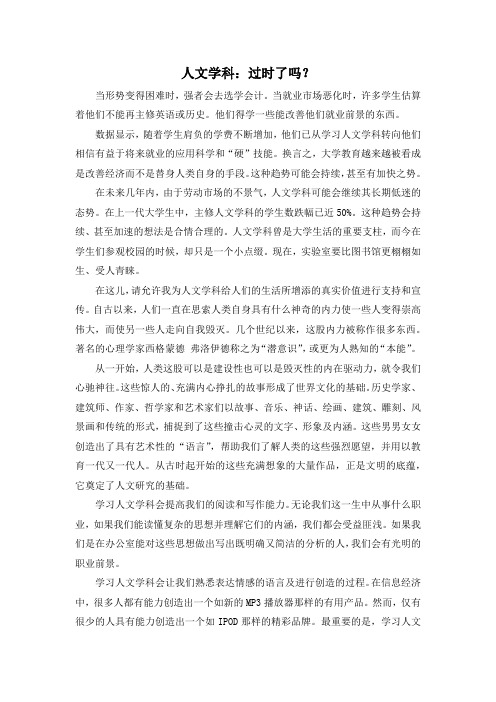
人文学科:过时了吗?当形势变得困难时,强者会去选学会计。
当就业市场恶化时,许多学生估算着他们不能再主修英语或历史。
他们得学一些能改善他们就业前景的东西。
数据显示,随着学生肩负的学费不断增加,他们已从学习人文学科转向他们相信有益于将来就业的应用科学和“硬”技能。
换言之,大学教育越来越被看成是改善经济而不是替身人类自身的手段。
这种趋势可能会持续,甚至有加快之势。
在未来几年内,由于劳动市场的不景气,人文学科可能会继续其长期低迷的态势。
在上一代大学生中,主修人文学科的学生数跌幅已近50%。
这种趋势会持续、甚至加速的想法是合情合理的。
人文学科曾是大学生活的重要支柱,而今在学生们参观校园的时候,却只是一个小点缀。
现在,实验室要比图书馆更栩栩如生、受人青睐。
在这儿,请允许我为人文学科给人们的生活所增添的真实价值进行支持和宣传。
自古以来,人们一直在思索人类自身具有什么神奇的内力使一些人变得崇高伟大,而使另一些人走向自我毁灭。
几个世纪以来,这股内力被称作很多东西。
著名的心理学家西格蒙德弗洛伊德称之为“潜意识”,或更为人熟知的“本能”。
从一开始,人类这股可以是建设性也可以是毁灭性的内在驱动力,就令我们心驰神往。
这些惊人的、充满内心挣扎的故事形成了世界文化的基础。
历史学家、建筑师、作家、哲学家和艺术家们以故事、音乐、神话、绘画、建筑、雕刻、风景画和传统的形式,捕捉到了这些撞击心灵的文字、形象及内涵。
这些男男女女创造出了具有艺术性的“语言”,帮助我们了解人类的这些强烈愿望,并用以教育一代又一代人。
从古时起开始的这些充满想象的大量作品,正是文明的底蕴,它奠定了人文研究的基础。
学习人文学科会提高我们的阅读和写作能力。
无论我们这一生中从事什么职业,如果我们能读懂复杂的思想并理解它们的内涵,我们都会受益匪浅。
如果我们是在办公室能对这些思想做出写出既明确又简洁的分析的人,我们会有光明的职业前景。
学习人文学科会让我们熟悉表达情感的语言及进行创造的过程。
UNIT 3 My First Job课文翻译大学英语二word版本
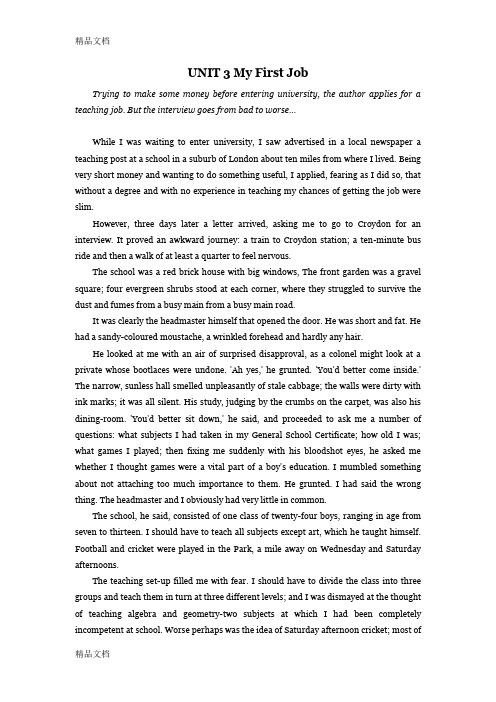
UNIT 3 My First JobTrying to make some money before entering university, the author applies for a teaching job. But the interview goes from bad to worse...While I was waiting to enter university, I saw advertised in a local newspaper a teaching post at a school in a suburb of London about ten miles from where I lived. Being very short money and wanting to do something useful, I applied, fearing as I did so, that without a degree and with no experience in teaching my chances of getting the job were slim.However, three days later a letter arrived, asking me to go to Croydon for an interview. It proved an awkward journey: a train to Croydon station; a ten-minute bus ride and then a walk of at least a quarter to feel nervous.The school was a red brick house with big windows, The front garden was a gravel square; four evergreen shrubs stood at each corner, where they struggled to survive the dust and fumes from a busy main from a busy main road.It was clearly the headmaster himself that opened the door. He was short and fat. He had a sandy-coloured moustache, a wrinkled forehead and hardly any hair.He looked at me with an air of surprised disapproval, as a colonel might look at a private whose bootlaces were undone. 'Ah yes,' he grunted. 'You'd better come inside.' The narrow, sunless hall smelled unpleasantly of stale cabbage; the walls were dirty with ink marks; it was all silent. His study, judging by the crumbs on the carpet, was also his dining-room. 'You'd better sit down,' he said, and proceeded to ask me a number of questions: what subjects I had taken in my General School Certificate; how old I was; what games I played; then fixing me suddenly with his bloodshot eyes, he asked me whether I thought games were a vital part of a boy's education. I mumbled something about not attaching too much importance to them. He grunted. I had said the wrong thing. The headmaster and I obviously had very little in common.The school, he said, consisted of one class of twenty-four boys, ranging in age from seven to thirteen. I should have to teach all subjects except art, which he taught himself. Football and cricket were played in the Park, a mile away on Wednesday and Saturday afternoons.The teaching set-up filled me with fear. I should have to divide the class into three groups and teach them in turn at three different levels; and I was dismayed at the thought of teaching algebra and geometry-two subjects at which I had been completely incompetent at school. Worse perhaps was the idea of Saturday afternoon cricket; most ofmy friends would be enjoying leisure at that time.I said shyly, 'What would my salary be?' 'Twelve pounds a week plus lunch.' Before I could protest, he got to his feet. 'Now', he said, 'you'd better meet my wife. She's the one who really runs this school.'This was the last straw. I was very young: the prospect of working under a woman constituted the ultimate indignity.进入大学之前,尽力去攒一些钱。
新标准大学英语(第二版)综合教程2 Unit 3 B篇练习答案及课文翻译

Text
2
My heart was beating loudly, my mouth was dry and the adrenaline
was pumping. I was so close to the realisation of my childhood
dream and the feeling was fantastic; it was completely exhilarating,
Text
7
I knew I would do my best, that I would run my heart out and finish the race. I felt the performer in me move in and take over. I had just two laps to run, that was all. Just two laps until the emotional and physical strain of the past two days and the last
jump just a couple of hours earlier, but I shut out all thoughts of
pain. I tried to concentrate on the crowd. They were so vocal. My spirits lifted and I felt composed.
28 years would be eclipsed by victory or failure. This race was all
about survival. It’s only two minutes, I kept telling myself, anyone can run for two minutes.
全国职业教材新视野大学英语教程第三版读写教程2课文翻译
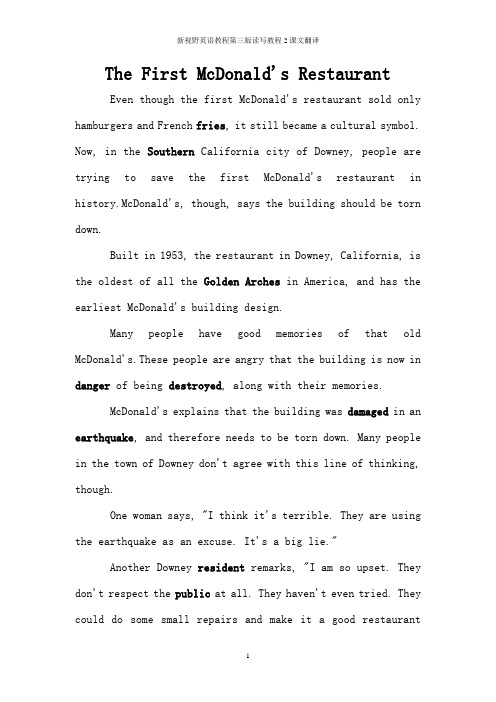
The First McDonald's RestaurantEven though the first McDonald's restaurant sold only hamburgers and French fries, it still became a cultural symbol. Now, in the Southern California city of Downey, people are trying to save the first McDonald's restaurant in history.McDonald's, though, says the building should be torn down.Built in 1953, the restaurant in Downey, California, is the oldest of all the Golden Arches in America, and has the earliest McDonald's building design.Many people have good memories of that old McDonald's.These people are angry that the building is now in danger of being destroyed, along with their memories.McDonald's explains that the building was damaged in an earthquake, and therefore needs to be torn down. Many people in the town of Downey don't agree with this line of thinking, though.One woman says, "I think it's terrible. They are using the earthquake as an excuse. It's a big lie."Another Downey resident remarks, "I am so upset. They don't respect the public at all. They haven't even tried. They could do some small repairs and make it a good restaurantagain."McDonald's managers say the restaurant is losing money at that location. There is no room for a drive-thru window, or for seating inside.After the earthquake, they say it was impossible to fix.The managers want to build a copy of this building at another location instead.Building inspectors, on the other hand, say that the structure can be repaired, but that it will be expensive. Many people say that McDonald's can certainly afford to pay that amount.Some think that McDonald's real reason for wanting to close down the restaurant has nothing to do with money.Modern McDonald's restaurants often have a sign claiming that a man named Ray Kroc opened the first McDonald's restaurant in Illinois in 1955. The truth, however, is that Mr. Kroc actually learned the fast food business from Dick and Mac McDonald in ter, Mr. Kroc bought their restaurants.Thus, many people in Downey think McDonald's is trying to change history, though the company denies this.To local historians, this explanation makes total sense. One historian said, "We should not rewrite the past. Ray Kroc did not invent McDonald's. The McDonald brothers did."These days, a group of historians want the building tobe added to the National Register of Historic Places so that the city of Downey will be able to stop McDonald's from tearing the building down. The McDonald's managers are very angry, and have abandoned the structure.Everyone hopes that the McDonald's managers and the people of Downey will soon find peace. The building is still there, but boards cover the windows.Even so, people drive by to remember their McDonald's, taking pictures of a moment in history before it gets taken away.第一家麦当劳餐馆虽说第一家麦当劳餐馆只售汉堡包和薯条,它还是成为了一种文化象征。
大学英语综合教程2第三单元课文翻译
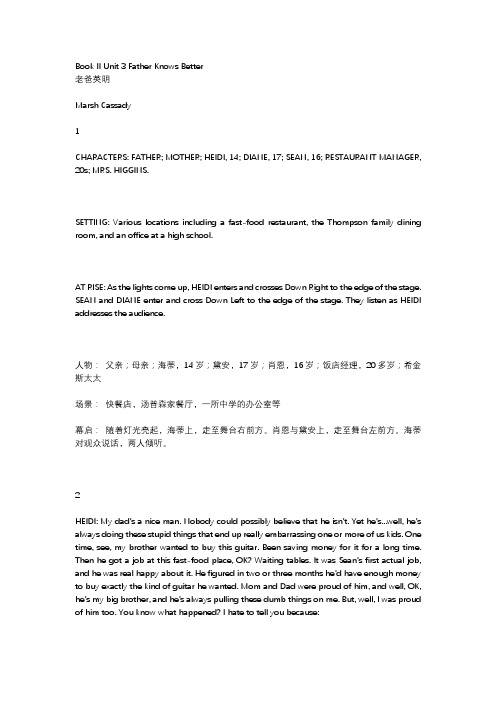
Book II Unit 3 Father Knows Better老爸英明Marsh Cassady1CHARACTERS: FATHER; MOTHER; HEIDI, 14; DIANE, 17; SEAN, 16; RESTAURANT MANAGER, 20s; MRS. HIGGINS.SETTING: Various locations including a fast-food restaurant, the Thompson family dining room, and an office at a high school.AT RISE: As the lights come up, HEIDI enters and crosses Down Right to the edge of the stage. SEAN and DIANE enter and cross Down Left to the edge of the stage. They listen as HEIDI addresses the audience.人物:父亲;母亲;海蒂,14岁;黛安,17岁;肖恩,16岁;饭店经理,20多岁;希金斯太太场景:快餐店,汤普森家餐厅,一所中学的办公室等幕启:随着灯光亮起,海蒂上,走至舞台右前方。
肖恩与黛安上,走至舞台左前方。
海蒂对观众说话,两人倾听。
2HEIDI: My dad's a nice man. Nobody could possibly believe that he isn't. Yet he's...well, he's always doing these stupid things that end up really embarrassing one or more of us kids. One time, see, my brother wanted to buy this guitar. Been saving money for it for a long time. Then he got a job at this fast-food place, OK? Waiting tables. It was Sean's first actual job, and he was real happy about it. He figured in two or three months he'd have enough money to buy exactly the kind of guitar he wanted. Mom and Dad were proud of him, and well, OK, he's my big brother, and he's always pulling these dumb things on me. But, well, I was proud of him too. You know what happened? I hate to tell you because:SEAN, DIANE and HEIDI: (In unison) Father knows better!海蒂:我老爸是个大好人。
新一代大学英语2课文翻译

About 2,400 years ago in Athens a man was put to death for askingtoo many questions. There were philosophers before him, but it was with Socrates that a the subject really took off. If philosophy has a patron saint it is Socrates.大约是2,400 年以前,在雅典,有一个人因为问了太多问题被判了死刑。
在他之前,也有许多哲学家,可哲学这门学科却是从他——苏格拉底开始,才进入一个真正腾飞的阶段。
苏格拉底之于哲学,就是一位引路和守护的圣人。
As a young man he had been a brave soldier fighting in the Peloponnesian War against the Spartans and their allies.In middle age he shuffled around the marketplace, stopping people from time to time and asking them awkward questions. That was more or less all he did. But the questions he asked were razor-sharp. They seemed straightforward; but they weren’t.年轻时的苏格拉底曾是一名勇敢的战士,参与了伯罗奔尼撒战争,抵御斯巴达人及其盟军。
到了中年,他在市集随处走动,时不时拦下路人,问他们一些难以回答的问题。
他差不多就只干这个。
但他的问题都很犀利,看似简单直白,实际却不好回答。
The word “philosopher” comes from the Greek words meaning “love of wisdom”. The Western tradition in philosophy spread from ancient Greece across large parts of the world, at time cross-fertilized by ideas from the East. The kind of wisdom that it values is based on argument, reasoning and asking question, not on believing things simply because someone important has told you they are true. Wisdom for Socrates was not knowing lots of facts, or knowing how to do something. It meant understanding the true nature of our existence, including the limits of what we can know. Philosophers today are doing more or less what Socrates was doing: asking tough questions, looking at reasons and evidence, struggling to answer some of the most important question we can ask ourselves about the nature of reality and how we should live.“哲学家”一词(philosopher)来源于希腊语,意思是“对智慧的热爱”。
大学英语精读第三版第二册英语课文[最新]
![大学英语精读第三版第二册英语课文[最新]](https://img.taocdn.com/s3/m/133a5123a22d7375a417866fb84ae45c3b35c260.png)
大学英语精读第三版第二册英语课文UNIT2essons from jeffersonJefferson died long ago, but may of his ideas still of great interest to us.Lessons from JeffersonThomas Jefferson, the third President of the United States, may be less famous than George Washington and Abraham Lincoln, but most people remember at last one fact about him: he wrote the Declaration of Independence.Although Jefferson lived more than 200 years ago, there is much that we learn from him today. Many of his ideas are especially interesting to modern youth. Here are some of the things he said and wrote:Go and see. Jefferson believed that a free man obtains knowledge from many sources besides books and that personal investigation is important. When still a young man, he was appointed to a committee to find out whether the South Branch of the James River was deep enough to be used by large boats. While the other members of the committee sat in the state capitol and studied papers on the subject, Jefferson got into a canoe and made on-the-spot-observations.You can learn from everyone. By birth and by education Jefferson belonged to the highest social class. Yet, in a day when few noble persons ever spoke to those of humble origins except to give an order, Jefferson went out of his way to talk with gardeners, servants, and waiters. Jefferson once said to the French nobleman, Lafayette, "You must go into the people's homes as I have done, look into their cooking pots and eat their bread. If you will only do this, you may find out why people are dissatisfied and understand the revolution that is threatening France."Judge for yourself. Jefferson refused to accept other people's opinions without careful thought. "Neither believe nor reject anything," he wrote to his nephew, "because any other person has rejected or believed it. Heaved has given you a mind for judging truth and error. Use it."Jefferson felt that the people "may safely be trusted to hear everything true and false, and to form a correct judgment. Were it left to me to decide whether we should have a government without newspapers or newspapers without a government, I should not hesitate a moment to prefer the latter."Do what you believe is right. In a free country there will always be conflicting ideas, and this is a source of strength. It is conflict and not unquestioning agreement that keeps freedom alive. Though Jefferson was for many years the object of strong criticism, he never answered his critics. He expressed his philosophy in letters to a friend, "There are two sides to every question. If you take one side with decision and on it with effect, those who take the other side will of course resent your actions."Trust the future; trust the young. Jefferson felt that the present should never be chained to customs which have lost their usefulness. "No society," he said, "can make a perpetual constitution, or even a perpetual law. The earth belongs to the living generation." He did not fear new ideas, nor did he fear the future. "How much pain," he remarked, "has been caused by evils which have never happened! I expect the best, not the worst. I steer my ship with hope, leaving fear behind."Jefferson's courage and idealism were based on knowledge. He probably knew more than any other man of his age. He was an expert in agriculture, archeology, and medicine. He practicedcrop rotation and soil conservation a century before these became standard practice, and he invented a plow superior to any other in existence. He influenced architecture throughout America, and he was constantly producing devices for making the tasks of ordinary life easier to perform.Of all Jefferson's many talents, one is central. He was above all a good and tireless writer. His complete works, now being published for the first time, will fill more than fifty volumes. His talent as an author was soon discovered, and when the time came to write the Declaration of Independence at Philadelphia in 1776, the task of writing it was his. Millions have thrilled to his words: "We hold these truths to beself-evident, that all men are created equal…When Jefferson died on July 4, 1826, the 50th anniversary of American independence, he left his countrymen a rich legacy of ideas and examples. American education owes a great debt to Thomas Jefferson, Who believed that only a nation of educated people could remain free.杰斐逊很久以前就死了,但是我们仍然对他的一些思想很感兴趣,杰斐逊的箴言, 布鲁斯.布利文、托马斯.杰斐逊美国第三任总统,也许不像乔治.华盛顿和亚伯拉罕.林肯那样著名,但大多数人至少记得有关他的一件事实:《独立宣言》是他起草的。
全新版大学英语[第二版]综合教程2课文翻译
![全新版大学英语[第二版]综合教程2课文翻译](https://img.taocdn.com/s3/m/53e72617dd36a32d7375818a.png)
Unit 1Text AHoward Gardner, a professor of education at Harvard University, reflects on a visit to China and gives his thoughts on different approaches to learning in China and the West.哈佛大学教育学教授霍华德·加德纳回忆其中国之行,阐述他对中西方不同的学习方式的看法。
Learning, Chinese-StyleHoward Gardner 1 For a month in the spring of 1987, my wife Ellen and I lived in the bustling eastern Chinese city of Nanjing with our 18-month-old son Benjamin while studying arts education in Chinese kindergartens and elementary schools. But one of the most telling lessons Ellen and I got in the difference between Chinese and American ideas of education came not in the classroom but in the lobby of the Jinling Hotel where we stayed in Nanjing.中国式的学习风格霍华德·加德纳1987年春,我和妻子埃伦带着我们18个月的儿子本杰明在繁忙的中国东部城市南京住了一个月,同时考察中国幼儿园和小学的艺术教育情况。
然而,我和埃伦获得的有关中美教育观念差异的最难忘的体验并非来自课堂,而是来自我们在南京期间寓居的金陵饭店的大堂。
全新版大学进阶英语综合教程(二)课文+翻译

After living in the 24-hour city of Las Vegas, Nevada for nearly ten years, my family and I decided to slow things down. My daughter wanted a horse. My husband wanted property. My son wanted a dirt bike. I wanted our family to be more self-sufficient.None of us felt that this could be accomplished where we were living and we all agreed that a move to the country would be great for everyone.Before long we set about looking for a home in Yucca, Arizona, a very small town of less than 1,000 people. It was while I was scanning listings from our real estate agent that I first learned of it. There was a home for sale there on 40 acres. When I called to inquire about the property, I was informed that there was no electricity available in the area. What? No electricity? I almost dismissed the idea immediately.The property was off the grid. It was not connected whatsoever to any utilities — power, water orsewer. Power was supplied by a wind turbine and solar panels. Water had to be hauled in and stored in two tanks located on the property. Forty acres would give us plenty of room for all of our animals and give my husband and son space to ride their ATVs. Besides, what better way is there to become more self-sustainable? After giving it some thought, we decided to put in an offer and moved in on Thanksgiving Day.When we first moved to the property, we did some remodeling and stayed in our motor home. We were confronted with real challenges at the time. The power kept going out, the main water line to the house broke, the plumbing backed up into the front yard and the generator died.But the setbacks just made us work harder. We slowly got things fixed and moved into the house after 38 days in the RV. The next challenge was to become familiar with your power system, and to learn the ins and outs of hauling your own water and generating your own power.Our off-the-grid system consists of eight solar panels (1,000 watts) that are mounted on a sun tracker rack. We also have a wind turbine that generates 3,000 watts in 24 mph winds. The energy generated by the wind and sun is stored in 16 6v golf cart batteries. We also have two 2,500-gallon above-ground water tanks and a 250-gallon propane tank. Every weekend, we haul two 275-gallon water tanks to the nearby town of Yucca and fill them with water, which we then pump into our big water tanks.While living here for the past four months has been a big adjustment, there are many benefits to living off the grid. I think one of the greatest is teaching my kids the importance of conservation. They used to take water, power and gas for granted. The first week we were here, we used almost 1,000 gallons of water. With only a5,000-gallon water tank, it didn’t take them long to understand that we had to use l ess water. We started taking quicker showers, doing only full loads of laundry, turning off the water while brushing our teeth or shaving.Over-consumption is even more clearly demonstrated by our electricity usage. We have a digital readout of how many volts of DC power we have stored in our batteries at any given time. If you turn on a light or the TV, the number goes down. In order to protect the batteries, the system is set up to shut the inverter off if the volts get too low. Then the power goes out. When we first moved in, we lost power almost daily. After this happens a few times, it becomes clear very quickly just how often you waste electricity. Everything from lights and ceiling fans to computers and radios were left on when they were not in use. The cell phone chargers were plugged in even when they weren’t charging anything. All of this uses unnecessary power. We are steadily learning to be more diligent with our power usage.In addition, we are also trying to make other changes. They include reducing the amount of trash we generate by recycling and composting, growing our own organic vegetables, and reusing and repurposing things that we would normally toss. We also want to produce our own eggs and goat’s milk in the near future.Overall, going off the grid has been great for our family. We have learned how to conserve power and water and to really appreciate what the earth gives to us every day. I hope that once my kids move out of the house, they will keep the habits that they have learned by living off the grid.I received an email from a reader who asked, “Why do some friendships end, no matter how much you want them to last?” She referred to having seen the question in one of my articles, Mystery of Friendship. As I wrote in it, I don’t think easy answers exist as to how friendships start, why some turn into lifetime ones, and why some end. Although I’ve tried answering the first two questions in other articles (To Have A Friend and Be A Friend), I still get surprised by friendships that endure and disillusioned by ones that slip away. Even so, I’ll try to offer some insights here as to why friendships end.My simple answer is that friendships end because the situations friends are in or even the friends themselves change. Others have similar answers. First, the situations friends face may change. The decision to relocate for a new school or job cannot help but affect a friendship. Likewise, if a friend is in an accident, develops an illness, or loses someone close, these situations cannot help but affect a friendship. Does a friendship need to end because of these changes? No, but it’ll require adjustments that one or both friends might not be willing to make. Second, the friends themselves may change. A significant reason that friendships often end when friendsare apart for an extended period of time (for summer camp, college, etc.) is that one or both of the friends change. I think it hurts less when both friends change, because then the breakup is more often mutual and so both friends get closure by both deciding to let go and move forward in their lives without eachother. What tends to hurt most is when just one friend changes. One friend might change social circles, become involved in new social organizations, start to date, get a pet, or take on someother venture that consumes more time and passion. Again, a friendship can endure these changes, unless one or both of the friends for some reason decide not to invest the time and energy involved in the adjustment period. (For example, one friend might forget the importance of the friendship due to the high of having a new pet or might feel that the change is impossible to overcome when one gets married but the other is still single.) In this situation, breakups may not be mutual and so one or both friends feel betrayed and end up with bitter memories about what was a precious friendship to them.There are other reasons why friendships end. For example, as much as two people might want a friendshipto survive, one or both of them might unintentionally neglect it. Friendship is often compared to a flower garden. Well, if flowers don’t get exposed regularly enough to sunlight and don’t get watered enough, flowers will wither and even die. The same applies to friendship. If week after week passes where plans are made to spend time together but are never honored, perhaps due to taking a friendship for granted, eventually even the closest of friendships may cease to have a reason to exist.Conflicts can also cause the end of friendships. If the flower is a fledgling plant, one blow might destroy it just as sometimes relatively young friendships aren’t strong enough to endure much conflict. Even those amazing close friendships, where friends love us no matter what our faults are, need care when it comes to conflicts. Sure, if a flourishing flower gets stepped on, it might revive on its own. Moreover, if it gets a little extra special care, it’ll probably bounce back as if it hadn’t ever been injured. At the same time, if a flower gets repeatedly trampled on, it’ll probably eventually break. Especially the friendships that have been around for a long time can endure storms, and even become stronger for them, but most friendships have breaking points.Nevertheless, while we can rarely predict at the outset which ones will last, most friendships do enrich us for however short or long they’re a part of our lives.In the sleepiness at the end of a library nap, I wasn’t sure where I was. I stretched out my arm to reach for a human being, but what I grabbed was a used copy of The Odyssey, the book about going home. My heart ached.It was 2 a.m. The library, flooded with white fluorescent light and smelling of musty books and sweaty sneakers, was eerily quiet. My readings seemed endless. I had been admitted into a three-course, yearlong freshman program called Directed Studies, dubbed Directed Suicide by Yalies. It was supposed to introduce us to “the splendors of Western civilization,” in the words of the catalog, by force-feeding the canons of philosophy, literature and history.I wanted very much to study the Western canon, because I knew nothing about it. Yes, McDonald’s ads and Madonna posters were plastered on Shanghai streets, but few Western ideas filtered through. We had been informed of Karl Marx’s habit of sitting at the same spot in the British Library, for instance, but had read none of his original words. Western civilization was different, mysterious and thus alluring. Besides, because I longed to be accepted here, I yearned to understand American society. What better way to comprehend it than to study the very ideas on which it is based?But at 2 a.m., I was tired of them all: Homer, Virgil, Herodotus and Plato. Their words were dull and the presentations difficult to follow. The professors here do not teach in the same way that teachers in Chinado. Studying humanities in China means memorizing all the “correct,” standard interpretations given during lectures. Here, professors ask provocative questions and let the students argue, research and write papers on their own. At Yale, I often waited for the end-of-class “correct” answers, which never came.Learning humanities was secure repetition in China, but it was shaky originality here. And it could be even shakier for me. The name Agamemnon was impossibly long to pronounce, and as a result I didn’t recognize it when we were discussing him in the seminars. I had written my first English essay ever just a year earlier, when applying to colleges, and now came the papers analyzing the canons. And I simply didn’t write in English fast enough to take notes in classes.I hoped my diligence would make up for lack of preparation. On weekend nights, when my American roommates were out on dates, I would tell them I had planned a date with Dante or Aristotle. (They didn’t think it was funny.)On one of those weekend nights, I wrote a paper on Aeneas, the protagonist of The Aeneid, who was destined to found Rome but reluctant to leave behind his native Troy. “Aeneas agonizes,” Iwrote. “He hesitates. Natural instincts call him to stick to the past, while at the same time, he feels obligatedto obey his father’s instructions for the future. His present life is split, pulled apart by the bygone days and by the days to come. ” I saw myself in what I wrote.During calls home every two weeks, my mother pleaded with me to take chemistry or biology. Science was the same everywhere, she said. And I, like everybody else from China, was well prepared in math, physics and chemistry. (To graduate from a standard six-year Chinese high school, one needs to take five years of physics, four years of chemistry and three years of biology.)Instead, I visited the writing tutor — there is one in every undergraduate residential hall — for every paper I turned in. My papers were always written days before they were due. I lingered after classes to question professors. My classmates lent me their notes so I could learn the skill of note-taking in English.By the time I missed home so much that soup dumplings and sautéed eels popped up in my head as I read, Nietzsche had replaced Plato on the chronological reading list and Flaubert Homer. And every paper of mine came back with an A.脱离电网的生活:一家城市居民如何发现了简单生活艾莉森·佐谢尔1.在内华达州的不眠之城拉斯维加斯生活了将近十年之后,我和我的家人决定放慢生活节奏。
- 1、下载文档前请自行甄别文档内容的完整性,平台不提供额外的编辑、内容补充、找答案等附加服务。
- 2、"仅部分预览"的文档,不可在线预览部分如存在完整性等问题,可反馈申请退款(可完整预览的文档不适用该条件!)。
- 3、如文档侵犯您的权益,请联系客服反馈,我们会尽快为您处理(人工客服工作时间:9:00-18:30)。
UNIT 3 My First Job
Trying to make some money before entering university, the author applies for a teaching job. But the interview goes from bad to worse...
While I was waiting to enter university, I saw advertised in a local newspaper a teaching post at a school in a suburb of London about ten miles from where I lived. Being very short money and wanting to do something useful, I applied, fearing as I did so, that without a degree and with no experience in teaching my chances of getting the job were slim.
However, three days later a letter arrived, asking me to go to Croydon for an interview. It proved an awkward journey: a train to Croydon station; a ten-minute bus ride and then a walk of at least a quarter to feel nervous.
The school was a red brick house with big windows, The front garden was a gravel square; four evergreen shrubs stood at each corner, where they struggled to survive the dust and fumes from a busy main from a busy main road.
It was clearly the headmaster himself that opened the door. He was short and fat. He had a sandy-coloured moustache, a wrinkled forehead and hardly any hair.
He looked at me with an air of surprised disapproval, as a colonel might look at a private whose bootlaces were undone. 'Ah yes,' he grunted. 'You'd better come inside.' The narrow, sunless hall smelled unpleasantly of stale cabbage; the walls were dirty with ink marks; it was all silent. His study, judging by the crumbs on the carpet, was also his dining-room. 'You'd better sit down,' he said, and proceeded to ask me a number of questions: what subjects I had taken in my General School Certificate; how old I was; what games I played; then fixing me suddenly with his bloodshot eyes, he asked me whether I thought games were a vital part of a boy's education. I mumbled something about not attaching too much importance to them. He grunted. I had said the wrong thing. The headmaster and I obviously had very little in common.
The school, he said, consisted of one class of twenty-four boys, ranging in age from seven to thirteen. I should have to teach all subjects except art, which he taught himself. Football and cricket were played in the Park, a mile away on Wednesday and Saturday afternoons.
The teaching set-up filled me with fear. I should have to divide the class into three groups and teach them in turn at three different levels; and I was dismayed at the thought of teaching algebra and geometry-two subjects at which I had been completely incompetent at school. Worse perhaps was the idea of Saturday afternoon cricket; most of
my friends would be enjoying leisure at that time.
I said shyly, 'What would my salary be?' 'Twelve pounds a week plus lunch.' Before I could protest, he got to his feet. 'Now', he said, 'you'd better meet my wife. She's the one who really runs this school.'
This was the last straw. I was very young: the prospect of working under a woman constituted the ultimate indignity.
进入大学之前,尽力去攒一些钱。
作者申请了一个教书职业。
但是面试变得越来越糟。
我的第一份工作
在我等着进大学期间,我在一份地方报纸上看到一张广告,说是在伦敦某郊区有所学样要招聘一名教师. 离我住处大约十英里, 我因为手头很拮据,同时也想干点有用的事,于是便提出了申请,在提出申请的同时我也担心,自己一无学位,二无教学经验,得到这份工作的可能性是微乎其微的。
然而,三天之后,却来了一封信,叫我到克罗伊顿去面试。
这上路去那儿原来还真麻烦:先乘火车到克罗伊顿车站,再乘十分钟公共汽车,然后还要步行至少四分之一英里。
结果,我在六月一个炎热的上午到了那儿,因为心情非常沮丧,竟不感到紧张了。
学校是一座装着大窗户了红砖房子。
前庭园是个铺着砾的正方形:四个角上各有一丛冬青灌木,它们经受着从繁忙的大街一吹来的尘烟,挣扎着活下去。
开门的显然是校长本人。
他又矮又胖,留着沙色的小胡子,前额上布满皱纹,头发差不多已经秃光。
他带着一种吃惊的、不以为然的神态看着我,就像一位上校看着一名没系好靴带的二等兵一样。
“哦,”他咕哝着说。
“你最好到里面来。
”那狭窄的,不见阳光的走廊里散发出一股腐烂的卷心菜味,闻上去很不舒服;墙上墨迹斑斑,显行很脏,周围一片静寂。
他的书房,从地毯上的面包屑来判断,也是他的餐室。
“你最好坐下,”他说,接着便问了我许多问题:为了得到普通学校证书我学过哪些课程;我多大岁数了;我会玩些什么游戏;问到这里他突然用他那双充满血丝的眼睛盯住我,问我是否认为游戏是儿童教育的一个极为重要的组成部分。
我含含糊糊地说了些不必太重视游戏之类的话。
他咕哝了几句。
我说了错话。
我和校长显然没有多少共同语言。
他说,学校只有一个班,二十四名男生,年龄从七岁到十三风不等,除了美术课他亲自教以外,其余所有的课程都得由我来教。
星期三和星期六的下午要到一英里以外的公园去踢足球、打板球。
整个教学计划把我吓坏了。
我得把全班学生分成三个组,按三种不同的程度轮流给他们上课;想到要教代数和几何这两门我在读书时学得极差的科目,我感到很害怕。
更糟糕的也许是星期六下午打板球的安排,因为这时候我的朋友大都会在悠闲地自得其乐。
我羞羞答答地问,“我的薪水是多少?”“每周十二镑外加中饭。
”还没等我来得及提出异
议,他已经站了起来。
“好了,”他说,“你最好见见我的妻子。
她才是这所学校真正的主管人。
”
我再也无法忍受了。
我当时很年轻,想到将在一个女人手下干活,就觉得是最大的侮辱。
